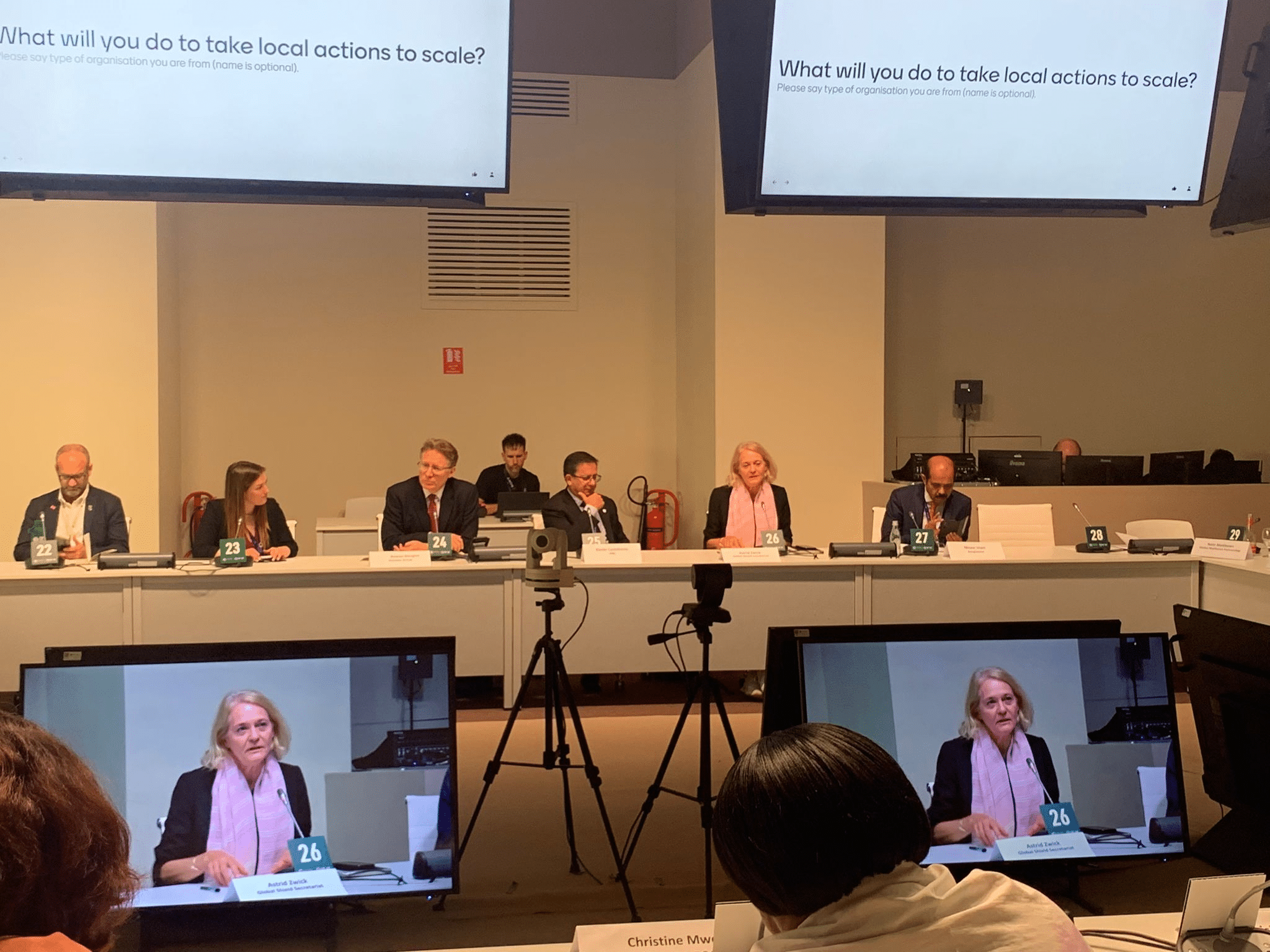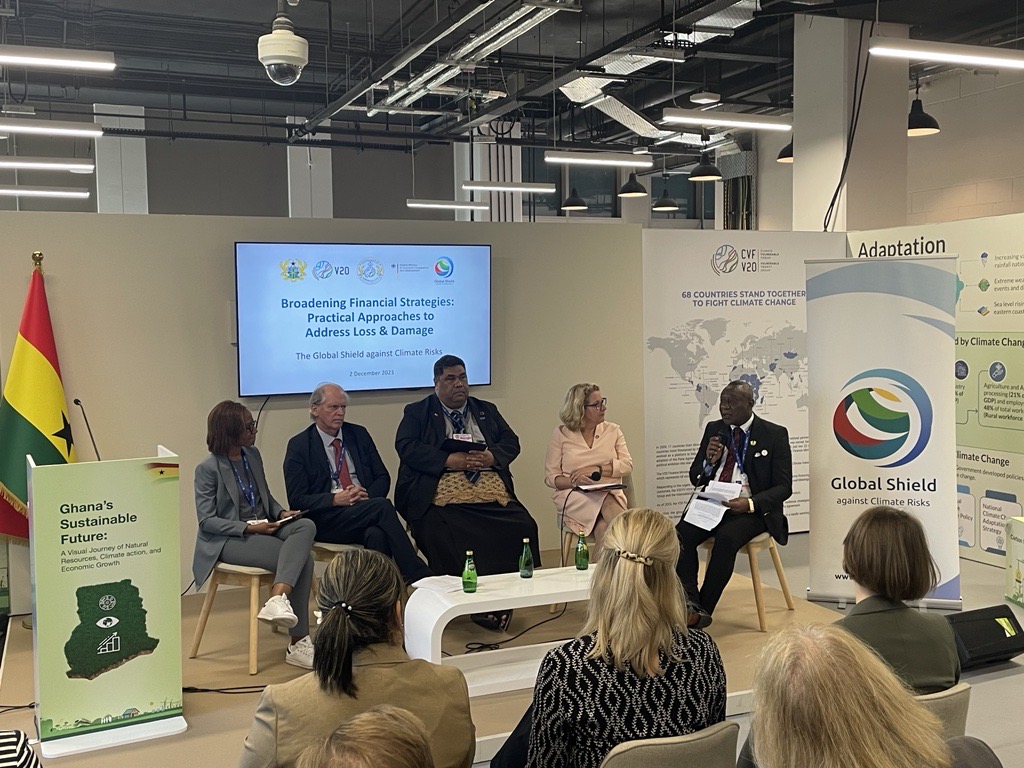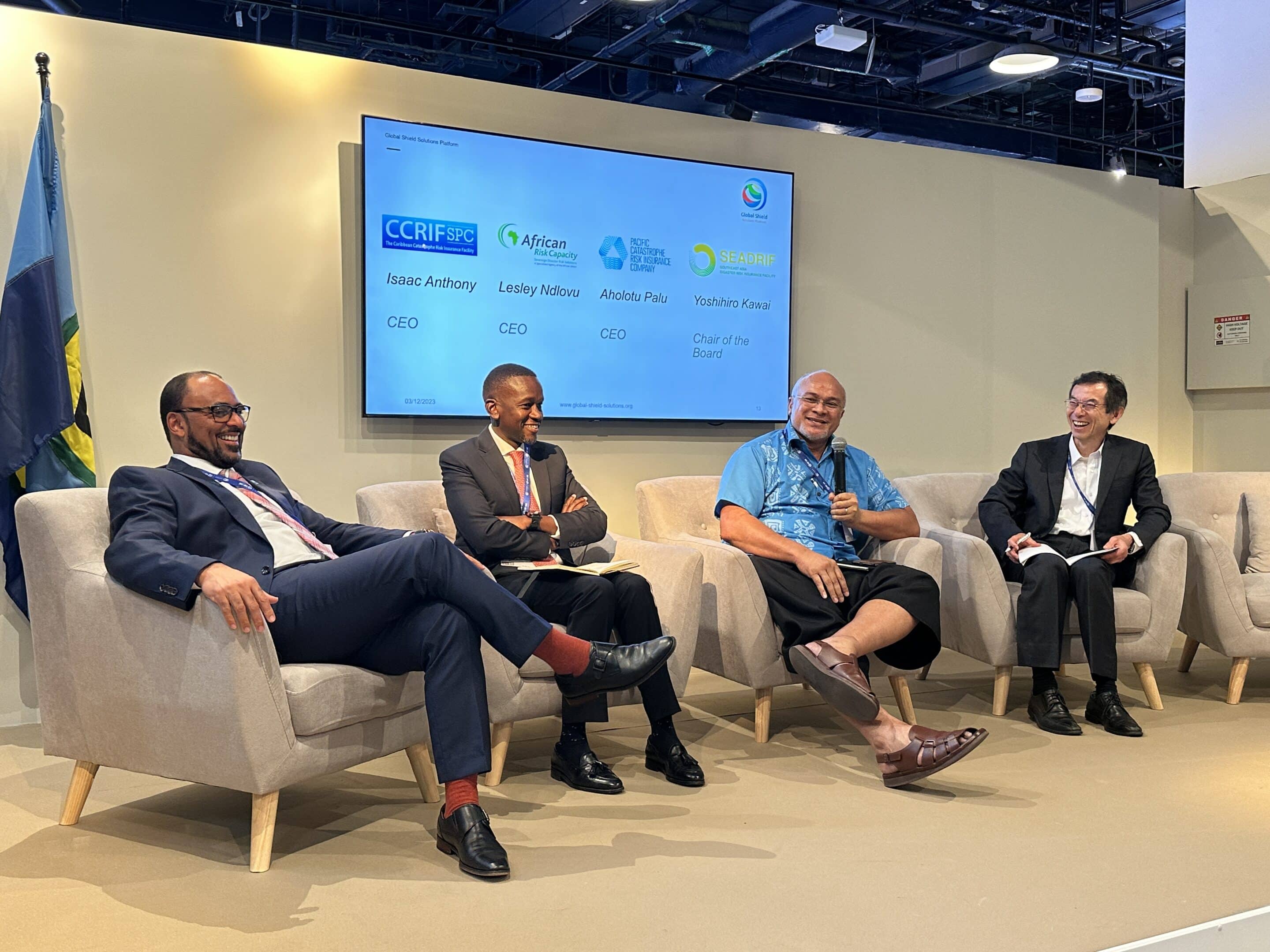The UN Climate Conference 2023 in Dubai (COP28) started with an encouraging signal: In the opening plenary, COP28 President Sultan Al Jaber announced an agreement on the set-up of a fund to respond to climate-related losses and damages – after decades of tireless calls for action from climate-vulnerable countries.
With its strong emphasis on country ownership, national response systems and long-term resilient recovery, the fund for dealing with loss and damage promises to become an integral part of a global financial system that is fit-for-climate. The attention now lies on making the fund operational and strengthening the interaction with the “mosaic” of funding arrangements that aim to mobilize additional resources to complement the fund.
In the advance unedited version of the COP28 decision, the V20/G7 Global Shield against Climate Risks is explicitly welcomed as one of these arrangements to strengthen the response to loss and damage. The Global Shield can certainly play a crucial role in ultimately building domestic and regional protection systems for the sustainable resourcing of financial and social protection packages – all to protect V20 economies and communities.
Henry Kokofu, Special Envoy of the CVF Ghana Presidency, representing V20 Chair, Global Shield Co-Chair, and Ghana’s Minister of Finance Ken Ofori-Atta, said: “Through collaboration with the Global Shield, we look forward to strengthening our locally-owned risk insights through a toolkit of financial instruments to build a pipeline of adaptation and loss-and-damage-related projects for effective climate risk management.”
The Global Shield was featured in more than 15 side events throughout COP28, where representatives from Global Shield pathfinder countries and partner organizations shared valuable lessons from their experiences in the past year since the initiative’s launch at COP27. They emphasized the Global Shield’s demand-driven approach to deliver comprehensive financial protection in vulnerable countries. As a fully operational initiative, the Global Shield stands ready to complement the work of the fund for dealing with loss and damage by facilitating more and better financial protection, which provides governments, businesses, and people in vulnerable countries with quick and reliable funding to deal with climate impacts.

Dr. Astrid Zwick, Co-Director of the Global Shield Secretariat, introduces the Global Shield at an event organized by the UNFCCC Climate Champions
During the high-level side event “Broadening Financial Strategies: Practical Approaches to Address Loss and Damage – The Global Shield against Climate Risks” the Global Shield Co-Chairs and key partners cast a look back at the past year and discussed how the Shield can take the next steps towards implementing comprehensive protection packages.
Co-hosted by Ghana’s Ministry of Finance and the German Federal Ministry for Economic Cooperation and Development (BMZ), the panel featured Tonga’s Finance Minister Tiofilusi Tiueti and other high-level speakers from the World Bank and the Caribbean Policy Development Centre. They discussed how the Global Shield can support marginalized people in climate-vulnerable countries as they address climate-related losses and damages through pre-arranged and trigger-based finance.
Henry Kokofu, Special Envoy of the CVF Ghana Presidency and Executive Director of the Environmental Protection Agency (EPA), shared how Ghana paved the way to scale up financial protection through a series of comprehensive consultations in the past five months. Throughout the process, the Global Shield – together with the Global Risk Modelling Alliance (GRMA) – supported the government in generating a better understanding of the climate risks that Ghana is facing, how to manage these risks effectively, and what kind of risk finance instruments can be used to fill protection gaps.
As a result, Ghana’s Ministry of Finance had submitted a Request for Support to the Global Shield just before COP28, making it the first Global Shield pathfinder country to achieve this milestone. The Request focusses on four areas: agricultural insurance, urban flooding, coastal erosion, and the Akosombo Adaptive Capacity and Climate Resilience Programme. Ghana is now looking forward to further collaborating with the Global Shield and strengthening the country’s climate risk management through a toolkit of financial instruments.
At a joint press conference in the German pavilion following the high-level event, Svenja Schulze, German Federal Minister for Economic Cooperation and Development, stressed the importance of the Shield’s comprehensive risk management approach. She highlighted that the experiences from the inclusive country-driven process in Ghana should be integrated in the set-up of the new fund for dealing with loss and damage.

From left to right: Ekhosuehi Iyahen (IDF), Jürgen Voegele (World Bank), H.E. Tiofilusi Tiueti (Minister of Finance, Tonga), Svenja Schulze (Federal Minister, BMZ), and Hon. Dr. Henry Kokofu (CVF Presidency, Ghana)
Another Global Shield highlight at COP28 was the launch of the Global Shield Programme for Resilient Risk Pools, during the side event “Unleashing Regional Resilience through a Thematic Window for Regional Risk Pools. This Programme is a support mechanism of the Global Shield Solutions Platform, one of the three Global Shield Financing Vehicles.
The Programme for Resilient Risk Pools offers a single access route to pooled funding that Regional Risk Pools can access directly and according to their own needs. Regional Risk Pools are a cornerstone of the global disaster risk finance architecture. They provide climate-vulnerable countries with financial protection at reasonable costs through sovereign parametric insurance products.
Tiofilusi Tiueti, Tonga’s Finance Minister, said: “Regional Risk Pools emerge significant to address climate risks, to reduce expenses, to scale up disaster response, and invest in climate resilience. International cooperation becomes crucial in this context, let’s work together for great, strong, efficient and fair Regional Risk Pools.”
The side event shed light on the strong partnership between the Global Shield, the Global Shield Solutions Platform, and the Regional Risk Pools in their endeavor to strengthen vulnerable countries’ financial resilience to climate and disaster risks. The Chairs and CEOs of the four risk pools – Caribbean Catastrophe Risk Insurance Facility Segregated Portfolio Company (CCRIF SPC), African Risk Capacity (ARC), Southeast Asia Disaster Risk Insurance Facility (SEADRIF), and Pacific Catastrophe Risk Insurance Company (PCRIC) – stressed the need to scale up financial protection and improve technical capacity-building: While Isaac Anthony (CEO, CCRIF SPC) emphasized the need to close protection gaps, Lesley Ndlovu (CEO, ARC) and Yoshihiro Kawai (Chair, SEADRIF) see the Global Shield Programme for Resilient Risk Pools as an opportunity to help deliver, diversify and become more efficient in catering vulnerable countries’ needs. Aholotu Palu (CEO, PCRIC) hopes that the new Programme can help improve affordability through premium support and technical capacity.

CEOs and Chairs from Regional Risk Pools at the GSSP launch event
One year after its launch, the Global Shield has become an integral part of the loss and damage funding arrangements and proved its readiness to effectively support vulnerable countries in responding to climate disasters. During COP28, the joint V20 and G7 initiative was represented at a variety of sessions, strengthening engagement with a diverse group of stakeholders, including civil society organizations and private sector representatives. Across the negotiations on loss and damage, in the side events and hallways, the sense of urgency was palpable at this year’s climate conference and the imperative to break down silos and join efforts to address the increasingly complex impacts of climate change was more evident than ever.
